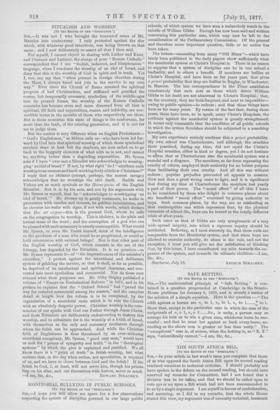RITUALISM AND WORSHIP.
[TO THE EDITOR OF THE “SPEOT&TOIV] SIR,—It was not I who brought the honoured name of Mr. Maurice into controversy. I only protested against the slur which, with whatever good intentions, was being thrown on that name ; and I now deliberately re-assert all that I then said.
For myself, I cannot object to sharing with Luther and Knox, and Cranmer and Latimer, the charge of your "Roman Catholic" correspondent that I use "foolish, indecent, and blasphemous" language, when I condemn the worship of an idol of bread, and deny that this is the worship of God in spirit and in truth. Yet I, too, can say that "when present in foreign churches during the Mass, I always kneel and join in the service in my own way." Ever since the Church of Rome arrested the spiritual progress of half Christendom, and stiffened and petrified the coarse, but temporarily necessary, symbolism of the middle-ages into its present forms, the worship of the Roman Catholic countries has become more and more divorced from all that is spiritual, till faith and superstition, reason and infidelity, are con- vertible terms in the mouths of those who respectively use them. But in those countries this state of things is the misfortune, far more than the fault, of the existing generation, and it is not for me to judge them.
But the matter is very different when we English Protestants- " God's Englishmen," as Milton calls us—who have been led for- ward by God into that spiritual worship of which those symbolical services were at best but the shadows, arc now called on to go back to the beggarly elements of what with us is not, and cannot be, anything better than a degrading superstition, Mr. Symes asks if I have ever met a Ritualist who acknowledges to worship- ping an idol of bread ?' If not, by what right" do I "attribute such worship to an earnest and hard-working body of fellow-Christians?" I reply that no idolator (except, perhaps, the merest savage) acknowledges that he worships the idol itself. Buddh and Vishnu are as much symbols as the Hocus-pocus of the English Ritualist. But it is by his acts, and not by his arguments with Mr. Symes or myself, that he "acknowledges to worshipping an idol of bread.'" He dresses up in gaudy vestments, he walks in procession with candles and incense, he gabbles incantations, and he elevates his wafer with signs, if not with words, which declare that Hoc est corpus—this is the present God, whom he calls on the congregation to worship. This is idolatry, in the plain and honest sense of the word ; and the conception of a god who can be pleased with such mummery is utterly contemptible. What would Mr. Symes, or even Mr. Tooth himself, think of the intelligence or the goodness of a man who could be so propitiated, or could so hold communion with rational beings? Nor is that other part of the English worship of God, which consists in the use of the Liturgy, less degraded by the Ritualists. It is no question—as Mr. Symes represents it—of '' the impressiveness of the minister's elocution." I protest against the intentional and deliberate system of gabbling the service, so that it shall, as far as possible, be deprived of its intellectual and spiritual character, and con- verted into mere symbolism and ceremonial. Nor do these men conceal what their purposes are. Mr. Orby Shipley published a volume of "Essays on Ecclesiastical Reform" in 1873, and in his preface he explains that the "Oxford School " had "paved the way for restored ceremonial among the masses," and the essayists detail at length how the reform is to be completed, by the organisation of a sacerdotal caste which is to rule the Church with an absolutely despotic power. Christian worship is the com- munion of our spirits with God our Father through Jesus Christ, and these Ritualists are deliberately endeavouriog to destroy this worship, and to substitute for it the worship of a fetish of bread, with themselves as the only and necessary mediators through whom the fetish can be approached. And while the Christian faith of Englishmen is thus threatened by an ever-widening sacerdotal conspiracy, Mr. Symes, "good easy man," would have
us seek for "points of sympathy and truth" in the "theological systems" by which the plot is explained and justified. We all know there is a "point of truth " in fetish-worship, but what matters that, in the day when action, not speculation, is required of us, and we have to choose between God and the fetish? If the fetish be God, I, at least, will not serve him, though his priests leap on his altar, and cut themselves with knives, never so much.






























 Previous page
Previous page